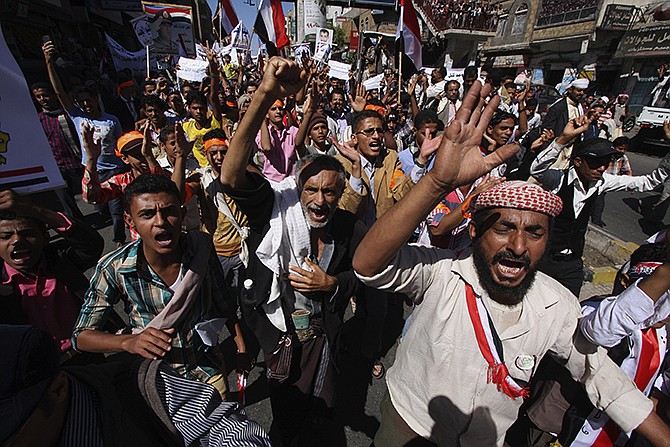SANAA, Yemen (AP) - As Western diplomats and staff fled Yemen on Wednesday, concern widened over the increasing turmoil in the impoverished nation, with Saudi Arabia arming loyal tribesmen across its southern border and Egypt readying a military unit to intervene if needed.
The U.S., British and French moved to close their embassies, signaling a belief that conditions in Yemen would only deteriorate further as the rebels, who have taken over in nearly half the provinces, try to expand their control.
In a show of bravado, the rebels seized about 20 vehicles left by U.S. diplomats and Marines at Sanaa's airport, officials said, speaking on condition of anonymity because they were not authorized to talk to the press. The Americans evacuated after destroying documents and heavy weapons at the embassy.
The rebels also seized weapons found in the U.S. vehicles, the officials added - apparently referring to personal sidearms the Pentagon said the Marines left behind because they could not take them on their departing commercial flight.
While Yemen has been in chaos for years, events took a dramatic new turn when the rebels, known as Houthis and suspected of being backed by Iran, took over the capital last fall and have spread over more of the country.
In January, the rebels put U.S.-backed President Abed Rabbo Mansour Hadi and his Cabinet ministers under house arrest, leading to their resignations. Subsequently, the Houthis, who are followers of the Shiite Zaydi sect in Sunni-majority Yemen, dissolved parliament and declared they were taking over the government.
The turmoil is starting to resonate around the Middle East, already shaken by bloody conflicts in Syria, Libya and Iraq.
As Houthi fighters advance to take more ground, Yemeni officials said Saudi Arabia, a staunch U.S. ally, was sending arms and funds to tribesmen in Yemen's Marib province to bolster them against the rebels.
Saudi Arabia has in recent months repeatedly stated its concern over the Houthis' power grab, but the deeply secretive oil-rich kingdom has said nothing about arming or funding tribesmen there to fight the Shiite rebels.
Marib is an exclusively Sunni, energy-rich desert area on the border with Saudi Arabia where tribes have long been close to the Saudis. It is also home to a sizable number of militants from the local branch of al-Qaida, the Houthis' sworn enemy.
Marib's tribal leaders, like many others in Yemen, have been on the receiving end of Saudi largesse for decades, and some of them hold Saudi nationality.
"Marib is the heart of Sunni tribal power," said Majid al-Modhaj, a Yemeni analyst. "Fighting there will take the Houthis away from their comfort zone in mountainous areas and into plain and flat desert land they are not used to."
Egypt has set up a special rapid deployment force that could intervene if the Houthis threaten shipping lanes in the strategic Red Sea, according to three Egyptian security officials. The force, they said, is drawn from the 3rd Army, which has been running security and intelligence operations in the Red Sea from its headquarters in Suez.
Yemen lies on one side of Bab al-Mandab, the narrow southern entrance of the Red Sea. The corridor leads up the Egyptian and Saudi coasts to Egypt's Suez Canal, a key sea route for oil traffic from the Gulf region.
The Egyptians and Saudis were coordinating a joint military response to deal with any eventuality in Yemen, including the disruption of shipping, the officials said.
The officials in both Yemen and Egypt spoke on condition of anonymity because they were not authorized to talk to the media.
"Yemen is like the moon to Egypt, but it is important because of Cairo's close ties with Saudi Arabia, to whom Yemen is a priority issue," said Michael W. Hanna, a Middle East expert from the New York-based Century Foundation.

